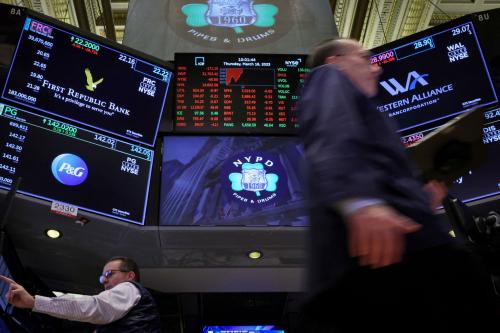Content from the Brookings Institution India Center is now archived. After seven years of an impactful partnership, as of September 11, 2020, Brookings India is now the Centre for Social and Economic Progress, an independent public policy institution based in India.
President Donald Trump has unleashed a wave of tariffs over the past year against many of its largest trading partners including China, Canada, the European Union, and Mexico. India too has been affected, particularly by tariffs on steel and aluminium. The rest of the world now confronts choices about how best to respond, in what areas, and with what adjustments to trade and economic policy. To discuss some of these issues, Brookings India hosted an expert roundtable discussion under the Chatham House Rule, which featured Jaimini Bhagwati, RBI Chair Professor at Indian Council for Research in International Economic Research (ICRIER), ex-Ambassador to the European Union, and former High Commissioner to the United Kingdom. The discussion was chaired by Shivshankar Menon, Distinguished Fellow at Brookings and India’s former National Security Advisor and Foreign Secretary.
Global trade roughly accounts for about 25% of global gross domestic product. In an era of interconnected markets and global supply chains, the current trade tensions between the U.S. and China are likely to have significant contagion effects around the world. Participants at the discussion agreed that the world economic and political order was undergoing a significant shift. Although the United States was taken for granted as the primary provider of public goods, under President Donald Trump, it was no longer willing to play that role and support a liberal rules-based order. On the contrary, there are concerns about it becoming more protectionist.
In an era of interconnected markets and global supply chains, the current trade tensions between the U.S. and China are likely to have significant contagion effects around the world.
On the other hand, China’s predominance in the global economy is becoming increasingly evident, with Asia now emerging as a China-centred trading system. For a majority of G20 countries, China is the largest trading partner, forming a solid base for trade and investment, and therefore engagement. This is coupled with an overlay of hard infrastructure provided by China through its Belt and Road Initiative. While the United States might be a part of the manufacturing chains in the region, it has no retail or consumer goods presence in ASEAN countries. This phenomenon has fragmented the world economic order into smaller blocs, creating new political spaces that can be exploited by China. Therefore, a potential trade war has significant implications not just for the economic order but also for the global political order.
Some participants were of the view that the current tensions between China and the United States were as much about jostling for strategic space as they are about trade, and that trade had become a tool for wider strategic competition. Certain sections of the U.S. population feel threatened by the rise of China and want to see the Chinese contained. The U.S. would also like to see changes in China’s economic structure and not just a reduction in its trade deficit. China on the other hand would likely be less willing to negotiate on structural changes like the Japanese did in the 1980s.
As for the impact of the U.S.-China trade dispute on India, it can be expected to not only affect India’s trade volumes but also the Rupee exchange rate.
In terms of future projections, it appeared unlikely that either China or the United States would back down from their positions because of domestic political compulsions. Xi Jinping, as the Communist Party’s General Secretary, has managed to consolidate all reins of power in China. With the Chinese economy slowing down, he would likely be basing his legitimacy increasingly on nationalism. As such, he could not be seen to buckle under U.S. pressure in the trade war. There is also a structural shift within corporate America against China, which forms a core political constituency for Trump. This means that just the settlement of trade or tariff issues is unlikely to see an end to tensions. We are therefore likely to see a systemic escalation going forward.
As for the impact of the U.S.-China trade dispute on India, it can be expected to not only affect India’s trade volumes but also the Rupee exchange rate. In the recent past, the Chinese have devalued their currency by 8 to 10 percent, making Indian goods less competitive. Nevertheless, the general view was that India should not take sides between the two strategic behemoths. While one is an immediate neighbour, the other is a valued strategic partner. India needs to reconcile its overall objective of higher economic growth with keeping its strategic relationships unimpaired. Some participants at the discussion also viewed the trade displacement caused because of this dispute as an opportunity for India. The Indian industry will need to identify sectors in which India has a comparative advantage and promote them as alternatives in the international market. Most importantly, the Indian government will have to closely monitor its domestic policy and take action on pending reforms.
In conclusion, it is too soon to gauge the economic and political impact of this dispute, and the next few months will provide a clearer picture. India should seize the opportunity presented by these tensions by being more competitive and following through on domestic reform.
Geoffrey Flugge, a research intern at Brookings India, contributed to this report.



Commentary
Implications of the US-China trade dispute
September 4, 2018